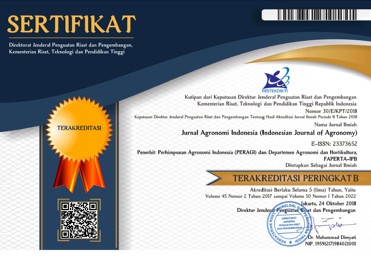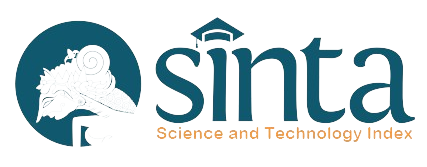Aplikasi Agens Hayati untuk Mengendalikan Hawar Daun Bakteri pada Produksi Benih Padi
Abstract
ABSTRACT
This experiment is a further development of several previous studies on the potential of Bacillus subtilis 5/B and Pseudomonas diminuta A6 (rhizobacteria), and Aeromonas sp. F112 (phyllobacteria) as biological agents. Research aimed to evaluate the application of biological agents to promote plant growth and to control bacterial leaf blight (BLB) disease in rice seed production. This research consisted of two experiments, the first was in the nursery while the second was in the field. The first experiment conducted in a completely randomized design with one factor (seed treatments) and three levels, i.e., control (untreated), matriconditioning + streptomycin sulphate 0.2% (BsM), biomatriconditioning + B. subtilis 5/B + P. diminuta A6 (BM). The second experiment was conducted in a randomized complete block design with one factor (biological agent aplication methods) and nine levels, i.e., control (untreated), matriconditioning + streptomycin sulphate 0.2% (BsM), biomatriconditioning + B. subtilis 5/B + P. diminuta A6 (BM), soaking of seedlings root with B. subtilis 5/B + P. diminuta A6 (RA), foliar spraying with Aeromonas sp. F112 (SD), BM + RA, BM + SD, RA + SD, BM + RA+ SD. The result showed that seed treatments significantly increased field emergence. Eventhough all treatments did not significantly affect plant growth, incidency and severity level of BLB disease, and yield components, biomatriconditioning showed a better improvement in yield components. The seeds produced from plants treated with the biological agents showed significantly higher vigor index than untreated and matriconditioning + streptomycin sulphate 0.2%.Keywords: Aeromonas sp., Bacillus subtilis, biomatriconditioning, seed quality, Pseudomonas diminuta
Published
2018-01-18
How to Cite
NurkartikaR., Satriyas IlyasS. I., & Machmud dan M. (2018). Aplikasi Agens Hayati untuk Mengendalikan Hawar Daun Bakteri pada Produksi Benih Padi. Jurnal Agronomi Indonesia (Indonesian Journal of Agronomy), 45(3), 235-242. https://doi.org/10.24831/jai.v45i3.13811
Section
Articles












